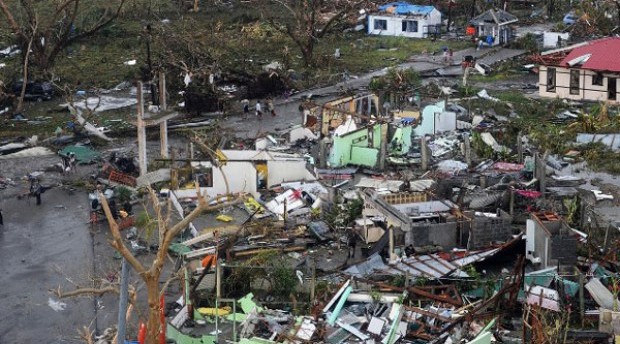
A general shot shows houses destroyed by the strong winds caused by Typhoon Yolanda in Tacloban City. AFP FILE PHOTO
A coalition of 20 of the country’s biggest civil society organizations has come forward not just to help survivors pick up the pieces of their lives but also to ensure the rebirth of cities and towns devastated by Supertyphoon “Yolanda.”
Immediately after 59 mayors underwent stress debriefing last week, members of Tabang Visayas Task Force were mobilized to send technical teams to plan with the typhoon-affected local governments.
“The concept is rebirth. Hopefully, we can rebuild each municipality or city much better than before. This is now their chance to correct what needs to be corrected,” said Benjamin Abadiano, president of Assisi Development Foundation (ADF), an organization heading the task force with the Philippine Daily Inquirer and Ayala Foundation.
Abadiano said the task force saw the importance of planning in the rehabilitation efforts of both the government and nongovernment organizations (NGOs), particularly in the hard-hit Samar and Leyte provinces.
“So they need technical people to help [the mayors] come up with a plan,” Abadiano said, referring to planners, builders, engineers, health professionals, livelihood experts and agriculturists.
Apart from providing resources, the task force acts as a channel among the civil society groups and local and national government agencies.
The 59 mayors from Leyte, Samar, Cebu and Bohol provinces flew to Manila for a two-day trauma healing and consultation workshop at Ateneo de Manila University on Dec. 16-17.
“We have to understand that most of them were victims, too. It will be good for them to be debriefed by a team of psychologists,” Abadiano said.
Pooling resources
On the second day of the workshop, the mayors shared to the civil society groups the specific needs and priorities of the local governments in the disaster-stricken areas.
“All of them were asking for food, shelter and help in the construction of the health clinics and schools in their respective areas,” Abadiano said.
The goal of the workshop, Abadiano stressed, was to match the priority needs that the organizations could possibly meet. In case there are gaps, Tabang Visayas will seek help from the national government to fill them, he said.
“We are pooling resources and services coming from various organizations to avoid duplication and at the same time find out the gaps,” he said.
Abadiano noted that the rehabilitation of the hard-hit areas could take between two and five years. He said ADF had committed to raise P577 million. The group has received P23.6 million so far.
Help kits
Assistance packages are labeled according to needs. An “education kit” worth P250 includes pad paper, ball pen, pencil, crayons and ruler, and a “dignity kit” worth P700 for personal hygiene has soap, a towel and pail, among other things.
The “food kit” pegged at P1,000 includes relief food items and vegetable seeds. There’s also an “infant kit” worth P1,000 for babies.
The costs of other kits, which will help in the recovery and rehabilitation efforts, such as boat and livelihood kits, and school and housing aids, range from P3,500 to P3 million.
The groups behind Tabang Visayas were also involved in Tabang Mindanao, which was formed to assist in areas hit by the El Niño weather phenomenon in 1998.
Abadiano said the task force was set up following his conversations with Ambassador Howard Dee and Inquirer president and CEO Sandy Prieto-Romualdez. The two were also part of Tabang Mindanao.
Tabang Visayas includes the Catholic Bishops’ Conference of the Philippines-National Secretariat for Social Action-Justice and Peace, Philam Foundation, Unilab Foundation, Philippine Business for Social Progress, Habitat for Humanity, Hands on Manila, Metrobank Foundation, Kaya Natin and Zuellig Family Foundation.
Other government agencies, like the Department of Education, Congress and the Department of Health, also serve as partners of Tabang Visayas.
RELATED STORIES:
Fashion industry fundraiser reaches P1M
Outpouring of support for ‘Yolanda’ survivors